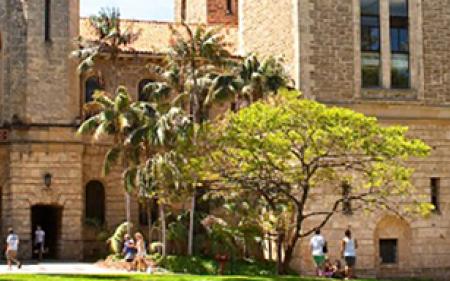Students may propose a flexible dual degree program that links two master’s degrees or a master’s degree and a JD degree.
Students must submit the proposal for the flexible dual degree no later than one term prior to matriculation into the second degree.
Dual degrees must be pursued concurrently, not consecutively. In order to meet this requirement, students interested in pursuing a dual degree must be matriculated in both programs for one full academic year (three quarters or two semesters). Students in a one year program must matriculate into the second program no later than the first admission term following fifty percent (50%) coursework completion of the first program.
Students are required to complete both degree programs within five years of matriculation in to the first program. Students must apply for graduation for both programs and both degrees will be awarded at the same time.
Any significant changes to the approved program require the student to resubmit a revised proposal packet to the deans/chairs/directors and advisors of both programs and the Office of Graduate Education.
Proposing a Flexible Dual Degree
To propose a flexible dual degree, the student must first apply to and be admitted by both programs, pay application fees and admissions deposits for both programs, and seek the counsel of an advisor in each program. Admission into each program does not take the place of filing a Flexible Dual Degree proposal (found on the Office of Graduate Education's website) nor guarantee approval of the proposal.
The dean, chair, or director of each degree program and both program advisors must carefully compare the requirements for each program and approve the proposed curriculum. The student must then submit a copy of the original requirements for each degree (printout from the unit website or copy from the student handbook is acceptable), a detailed course plan showing all proposed courses, the credit hours, and non-coursework requirements; a one to two- page statement of the educational/career objectives stating the reasons for the specific course selection and which courses most clearly serve the educational and career goals of the student; and current official/unofficial transcript(s) showing any work already completed towards the proposed program and degrees.
The student then submits the documents listed above to the Office of Graduate Education, which reviews and decides on the proposals. Proposals with errors or course/program inconsistencies will be returned for revision.
Once the proposal is approved, the student will be entered into the University computer system as a flexible dual degree student.
Curriculum Structure
Students may propose any flexible dual degree program that seems reasonable to them and their advisors for academic and career objectives. Only elective courses may be counted among the hours used for reduction.
All the core requirements of each program must be preserved and cannot be overlapped or waived. Credit reduction of elective courses will be limited to the following for each program as determined by the original number of credit hours required for each degree.
Required credit hours for degrees and flexible dual degree reduction allowed:
- 45-60 quarter hour degree program: Reduce a maximum of 10 quarter hours for the one degree without outside transfer credit. The traditional maximum outside transfer credit allowed in this case would be 11-15 quarter hours. A reduction of 15 quarter hours from the original degree will be the maximum allowed when combining outside transfer hours and the reduction of degree hours.
- 61-75 quarter hour degree program: Reduce a maximum of 12 quarter hours for the one degree without outside transfer credit. The traditional maximum outside transfer credit allowed in this case would be 15-19 quarter hours. A reduction of 25 quarter hours from the original degree will be the maximum allowed when combining outside transfer hours and the reduction of degree hours.
- 76-90 quarter hour degree program: Reduce or cross-count a maximum of 15 quarter hours for the one degree without outside transfer credit. The traditional maximum outside transfer credit allowed in this case would be 19-22.5 quarter hours. A reduction of 35 quarter hours will be the maximum allowed from the original degree when combining outside transfer hours and the reduction of degree hours.
Note: Credits at the Sturm College of Law for a JD degree are calculated using semester hours: 1 semester hour equals 1.5 quarter hours. A 90 semester hour JD degree may only be reduced by a maximum of 10 semester hours for a total of 80 semester hours completed for the JD (10 semester hours equals 15 quarter hours).
Non-Course Requirements
All non-course requirements must be fulfilled for both programs. If one of the non-course requirements of both intended programs is the writing and defense of a thesis, then (with prior approval from both departments) a combined thesis may be written as long as both departments are equally represented (from original proposal to completion) and so long as the most rigorous requirements are adhered to for completion and oral defense.
Students who decide to only complete one degree must inform the units, program advisors and the Office of Graduate Education in writing of their intention to nullify the flexible dual degree proposal. Students must complete all the original requirements for the remaining degree in order to graduate.



